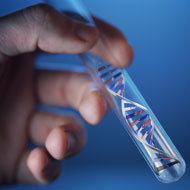Gene therapy treats muscular dystrophy in mice

US researchers have successfully used gene-editing to treat mice with muscular dystrophy.
US researchers have successfully used a gene-editing technique to treat mice with Duchenne muscular dystrophy.
Researchers at Duke University used a system called CRISPR-Cas9 to remove DNA that was preventing cells from producing a protein essential for muscle function, while a virus was used to deliver DNA alterations into the cells of mice.
It is the first time the technique has succesfully treated a genetic disease inside a fully developed living mammal with a strategy that has the potential to be translated to human therapy.
Gershbach, associate professor of biomedical engineering at Duke University, explains: "Recent discussion about using CRISPR to correct genetic mutations in human embryos has rightfully generated considerable concern regarding the ethical implications of such an approach,”
“But using CRISPR to correct genetic mutations in the affected tissues of sick patients is not under debate. These studies show a path where that’s possible, but there’s still a considerable amount of work to do.”
Duchenne muscular dystrophy is caused by problems with the body's ability to produce dystrophin, a long protein chain that binds the interior of a muscle finer to its surrounding support structure.
The condition affects one in 5,000 newborn males. Most patients are wheelchair-bound by the age of 10 and don't live beyond their early 30s.
The study, In vivo genome editing improves muscle function in a mouse model of Duchenne muscular dystrophy, is published in Science.



 The latest
The latest